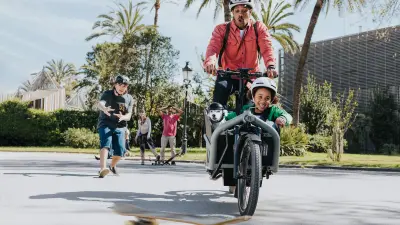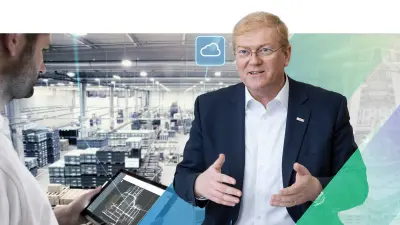Mobility transformation
Why sustainable mobility is about more than just technology
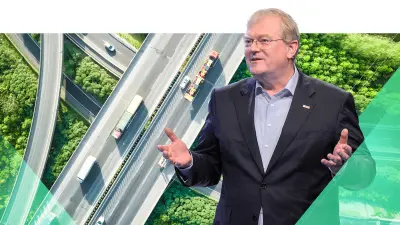
2023-09-10
Mobility is about much more than simply getting from A to B. Mobility makes us independent. Mobility permits exchange, dialogue, and collaboration across geographical and physical boundaries. Social systems such as work and education cannot function without mobility. The global trade in goods and services is the very foundation of our economic system. Mobility is the key to the diversity of our lifestyles.
by Stefan Hartung
Since the dawn of modern mobility, it has walked the tightrope between equality and freedom, moving somewhere between overflowing subways at daybreak and endless, open highways at sunset. On the one hand, mobility is something we can only conceive and shape together. On the other hand, it is very much a personal experience and a basic human need. After all, we don’t move only because we have to. We move because we are curious and inquisitive. Because we feel the need for growth and prosperity. Because we want to be free and independent.
This connection between the human quest for freedom and personal, individual mobility is something which, in my opinion, is frequently neglected in today’s discussions. Instead, we usually prefer to talk about prohibitions and regulations — especially in Germany and Europe.
The debate is also fueled by loudly proclaimed arguments guided more by ideological reservations than by economic or technical facts. And this is despite us sharing a single, common goal that is, sustainable, zero-emission mobility. In my view, the fact that emotions still run so high proves one thing above all — namely the significance that we attribute to our own individual mobility as part of an independent, self-determined life.
And that is precisely why we must shape today’s mobility in a sustainable manner. After all, unrestricted mobility — and thus a free society — will only be possible in the long term if it remains without negative impact on the very basis of our existence.
Doing without mobility means surrendering our freedom and prosperity
Sustainable mobility not only enables us to live an environmentally friendly, climate-aware life. It is also a fundamental prerequisite for us to be able to shape our lives as individually and independently in the future as we do today. However, if we ignore the limits of our freedom, we act without consideration or responsibility. And the same shortsightedness and lack of solidarity is demonstrated by all those who seek to radically restrict mobility and, in some cases, even prohibit it entirely. Doing without mobility also means surrendering our freedom and prosperity — and this applies not only to road users but to humanity as a whole. Nowhere is this more true than in the less privileged countries.


Therefore, we must use all the means available to us to drive this transformation in the world of mobility forward. In Germany, in Europe and everywhere else that we can. Wishful thinking won’t help us on this quest, but technology will. If we are to fight climate change effectively, while continuing to lead our modern lives, I believe that free competition and sophisticated technologies are the best weapons at our disposal. And this competition is very much a global competition. The climate knows no borders and does not care about national CO₂ figures. Only the global footprint counts, which means that our technological solutions must be just as diverse as the regions and roads of this world that we live in.
Understanding the diversity of mobility solutions
We are all in agreement that the powertrains of tomorrow will be climate-neutral. By no means, however, will they be the same in all areas. It is incumbent on globally operating companies in particular to understand the diversity of the various mobility solutions and fully address the needs of all applications. This means that we require the ideal solution for every application and for every region. That is why Bosch looks at the transformation of mobility in general, rather than focusing on one specific technology. Let’s take the powertrain as an example:
Electromobility is one of our core areas of business and is experiencing significant growth, particularly in China. In three years’ time, our global sales revenue in this area will likely amount to some six billion euros — and in this year alone, our sales of electric motors in the automotive sector will almost double.
We are also making excellent progress with the fuel cell: at our plant in Stuttgart, volume production of fuel cell powertrain systems has been underway for several weeks. Production has also commenced in China, and we intend to manufacture stacks for mobile applications in the United States as well. As soon as 2030, we expect one in five new commercial vehicles weighing six tons or more worldwide to be equipped with a fuel cell powertrain.
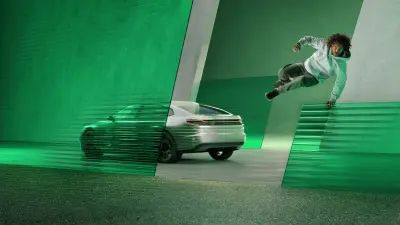
New powertrains require new infrastructures
And there are other interesting solutions — the hydrogen engine, for instance. It is particularly well suited for heavy-duty vehicles, which travel for long periods with very high loads. The hydrogen engine is entirely carbon-neutral and is 90 percent based on existing technologies. Four volume production projects are already underway at Bosch, and the market entry could occur as early as next year. But: new powertrains require new infrastructures — and the necessary political will, of course. Particularly in Europe, we have to move with much greater speed and determination — not least in the establishment of a hydrogen economy.
We at Bosch certainly intend to contribute to its creation: starting in 2025, we will bring our PEM stacks to market. The stack is the centerpiece of an electrolysis system and can produce around 23 kilograms of hydrogen per hour. We are of the firm conviction that a climate-neutral world can only exist with hydrogen.
23 kilograms
of hydrogen per hour can be produced with a PEM stack as a centerpiece of an electrolysis system
Altering the user experience: software-defined vehicles
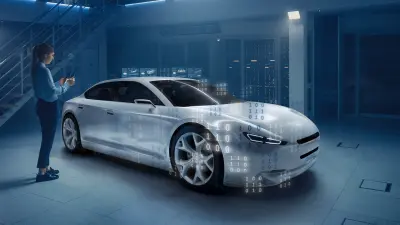
We all know that the great mobility transformation extends to much more than powertrains. And it’s not all about sustainability either: Software-defined vehicles will significantly alter the user experience as well as the value chains, while automated driving and new mobility concepts will also play their part. By 2030, the automotive software market is expected to be worth well over 200 billion euros — a three-fold increase over 2020. Bosch is currently experiencing double-digit growth rates in this market. And in the research and development areas of Bosch Mobility, software developers already account for more than half of the current workforce.
Bosch is increasingly adopting the role of a software company. Together with our customers and partners, we want to shape a new technological era of mobility. We want to set the world in motion and, of course, retain our position as the number one supplier.
To this end, we have adopted an entirely new structure at Bosch Mobility, with a realigned organization that can serve the needs of our customers and markets better than ever. We are all working feverishly behind the scenes to provide you with a faster, more flexible, and more adaptable Bosch, though one thing will remain unchanged: the high standards that we set ourselves. Our customers and partners expect us to provide innovative, sustainable, and economically successful products and services of exceptional quality. And we do our utmost to deliver.
The key for progress: motivation and innovation
At the IAA 2023, we can see what is already technically possible and what we can expect in the future. I am fascinated by what I have seen — as an engineer, as a manager, but primarily as a human. In our sector at least, we are edging ever closer to the solution in our fight against climate change — without having to forego too many of the modern comforts that we enjoy in today’s society.
For too long, we have put up with the less pleasant by-products of mobility, including preventable accidents and air pollution. Great advancements have been made in both areas. We are already making excellent progress: very soon, new powertrains and smart, connected vehicles will make our road traffic safer and more sustainable than ever before. Motivation and innovation are the key to this progress.
After all, human ingenuity requires freedom — and incentives of course. Mobility must remain an attractive market in the future. Only then will we be able to finance the significant upfront investments. However, if we combine the targeted economic success with a clear understanding of our own contribution to society, our motivation becomes even greater — as does the realm of what is possible.

Commercial success alone is not enough
At Bosch, this concept is reflected in our motto “Invented for life”. This means that commercial success alone is not enough for us. We want to make a valuable contribution to society and thereby help to make this world just a little bit better. And this is the objective that we pursue with our contributions to the sustainable transformation of mobility such as with our ABS for e-bikes, which ensures faster and safer braking even when fully loaded.
Our entire industry finds itself on the cusp of a new era. An era in which the economic success of the individual can be of benefit to the whole of society. Make no mistake, however: this undertaking will require an enormous effort on all our parts. We all know that each new challenge will be followed by another. But since we can only retain our individual freedom by ensuring sustainable mobility, these efforts will be more than worthwhile.
This is a challenging period of upheaval that will cost a great deal of time and money. In the end, however, these upfront investments will deliver not only economic rewards — they will also prove highly beneficial to us as humans living in a society geared toward progress. Never before has the purpose of our industry been so clearly apparent: we are creating a new mobility — and thereby safeguarding our future freedom and prosperity.
